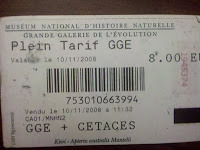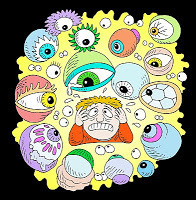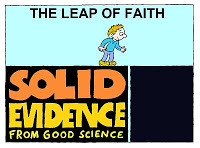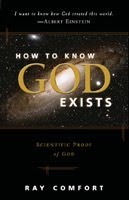Ray Comfort's Blog, page 71
October 4, 2010
Steven J's Review of my Book...
When I decided to publish Steven J's review of How to Know God Exists, it was on the condition that it didn't become tiresome. As we know, Steven is intelligent, and as with many intellectuals, he often talks above the heads of his hearers.
How can I say this without losing his friendship...it tends to become a cure for insomnia. For those who will say that he therefore wins the debate, so be it. They are very welcome to go to his new site and read the rest of his lengthy review. I will give the address if he will remind me of it. (Thank you Steven for all your hard work. I hope I haven't offended you).For Evangelism Resources, please visit LivingWaters.com.
How can I say this without losing his friendship...it tends to become a cure for insomnia. For those who will say that he therefore wins the debate, so be it. They are very welcome to go to his new site and read the rest of his lengthy review. I will give the address if he will remind me of it. (Thank you Steven for all your hard work. I hope I haven't offended you).For Evangelism Resources, please visit LivingWaters.com.
Published on October 04, 2010 19:48
Atheist Review of How to Know God Exists (by Steven J.).
REVIEW: Is Evolution Scientific (Part Two). Ray's problem in dealing with the Big Bang is that to him, the Big Bang simply means "nothing created everything." You will seek in vain, in chapter 3, for any mention of galactic redshifts, or the cosmic microwave background, or relative cosmic abundances of hydrogen and helium, or the expansion of space. Ray has, in short, no interest in the evidence the Big Bang was actually devised to explain. Note that Ray is not interested in arguing (as old earth creationists do) that God initiated the Big Bang; to Ray, the Big Bang is simply an atheistic creation story, not a reconstruction of the history of the universe.
The only question that matters to Ray is what came before the beginning, "nothing" or "God." That there was no "before the beginning" -- that the universe might have existed, if not forever, then at least for all the time that has ever existed and hence not need a cause or explanation -- Ray does not consider. He does insist that science has shown that the universe cannot have existed forever, though he does not say how science has shown this.
AUTHOR'S REBUTTAL: The reason I don't spend time addressing the thought that the universe is eternal, is because it is axiomatic. Everything is running down. It's not improving--from the stars, to our own sun, to the moon, to nature, to your grandmother. Everything degenerates. It withers and dies.
To believe that the universe is eternal is to paint yourself into an intellectual corner. If it was forever in the past, it would have become dust eons ago. This is so basic it hardly needs to be addressed. However, to appeal to an atheist to use common sense is senseless, because their premise is founded upon foolishness to begin with.
Again, the argument for God is not intellectual. A child can understand that nature didn't make itself. The argument is moral. The professing atheist don't like the thought of being morally responsible to God, so he pretends that He doesn't exist. Nevertheless, he must face a Law that says that lust is adultery, hatred is murder, and warns that all liars will have their part in the lake of fire.
This same morally perfect God is rich in mercy and has provided a way where every vile, sin-loving human being can be forgiven, cleansed, and granted everlasting life. And He made that way through the suffering death of Jesus Christ. He took the punishment for our sins upon Himself, rose from the dead, and now all who repent and trust Him receive everlasting life. Everyday, time runs out for 150,000 human beings. Seek God today, while you still have time. You may not even get a chance to wither.For Evangelism Resources, please visit LivingWaters.com.
The only question that matters to Ray is what came before the beginning, "nothing" or "God." That there was no "before the beginning" -- that the universe might have existed, if not forever, then at least for all the time that has ever existed and hence not need a cause or explanation -- Ray does not consider. He does insist that science has shown that the universe cannot have existed forever, though he does not say how science has shown this.
AUTHOR'S REBUTTAL: The reason I don't spend time addressing the thought that the universe is eternal, is because it is axiomatic. Everything is running down. It's not improving--from the stars, to our own sun, to the moon, to nature, to your grandmother. Everything degenerates. It withers and dies.
To believe that the universe is eternal is to paint yourself into an intellectual corner. If it was forever in the past, it would have become dust eons ago. This is so basic it hardly needs to be addressed. However, to appeal to an atheist to use common sense is senseless, because their premise is founded upon foolishness to begin with.
Again, the argument for God is not intellectual. A child can understand that nature didn't make itself. The argument is moral. The professing atheist don't like the thought of being morally responsible to God, so he pretends that He doesn't exist. Nevertheless, he must face a Law that says that lust is adultery, hatred is murder, and warns that all liars will have their part in the lake of fire.
This same morally perfect God is rich in mercy and has provided a way where every vile, sin-loving human being can be forgiven, cleansed, and granted everlasting life. And He made that way through the suffering death of Jesus Christ. He took the punishment for our sins upon Himself, rose from the dead, and now all who repent and trust Him receive everlasting life. Everyday, time runs out for 150,000 human beings. Seek God today, while you still have time. You may not even get a chance to wither.For Evangelism Resources, please visit LivingWaters.com.
Published on October 04, 2010 10:21
October 2, 2010
The Atheist Church
 "And it came to pass, when he was in a certain city, behold a man full of leprosy: who seeing Jesus fell on his face, and besought him, saying, Lord, if thou wilt, thou canst make me clean. And he put forth his hand, and touched him, saying, I will: be thou clean. And immediately the leprosy departed from him. And he charged him to tell no man: but go, and show yourself to the priest, and offer for thy cleansing, according as Moses commanded, for a testimony unto them. But so much the more went there a fame abroad of him: and great multitudes came together to hear, and to be healed by him of their infirmities. And he withdrew himself into the wilderness, and prayed" (Luke 4:12-16).
"And it came to pass, when he was in a certain city, behold a man full of leprosy: who seeing Jesus fell on his face, and besought him, saying, Lord, if thou wilt, thou canst make me clean. And he put forth his hand, and touched him, saying, I will: be thou clean. And immediately the leprosy departed from him. And he charged him to tell no man: but go, and show yourself to the priest, and offer for thy cleansing, according as Moses commanded, for a testimony unto them. But so much the more went there a fame abroad of him: and great multitudes came together to hear, and to be healed by him of their infirmities. And he withdrew himself into the wilderness, and prayed" (Luke 4:12-16).Most skeptics haven't a clue that the Bible is filled with "types." They don't know that the story of Moses is a type of the Christian's deliverance from death. God opens the Red Sea and delivers His people from the Egypt (the world) so that He can bring them into the Promised Land (Heaven). Like the army of pharaoh that died as they tried to follow the Hebrews, the world cannot enter Heaven. The story of a faultless Joseph is a type of Jesus being betrayed by his brothers (Israel), but then being exalted to the highest place of authority to rule the world. They read it without the "eyes" of their "understanding being enlightened." The same goes with Noah, Samson, etc. To the skeptic, they are just "silly" Bible stories.
Leprosy in Scripture is a type of sin. The disease causes the sufferer to lose the sense of pain. If you lie down for too long without moving, you feel uncomfortable and instinctively shift the position of your body. You do this unconsciously multiple times in your sleep. This allows your blood to flow. The Bible says "the life of the flesh is in the blood," and without the blood flowing through your flesh, your skin will lose its life. It will rot. A leper doesn't feel any sensation in his flesh, doesn't move, and it rots on his body.
The sense for sin is your conscience. When you lose the ability to feel any sense of guilt (that uncomfortable feeling) when you lie, steal, lust, fornicate, etc., your soul (the real you) begins to rot and die. You become unclean in the eyes of God.
When a sinner comes to Jesus, the authenticity of his cleansing is that he will satisfy the demands of Moses. "Moses" is a type of the moral Law of God. Multitudes of professed converts will never make it to Heaven because they had no regard to the moral Law. They professed to be cleansed, but they continued to lie, steal, lust, etc., and will be thrust from Heaven into Hell on the Day of Judgment (see Mathew 7:21-24). How do you do when examined by the Law? To satisfy its holy demands, you must first go to Jesus for cleansing.For Evangelism Resources, please visit LivingWaters.com.
Published on October 02, 2010 21:40
October 1, 2010
Advice About my Credibility
 "Ray First: there is no museum of evolution in Paris. I should know, I grew up there. Perhaps you are referring to the museum of natural history? One of its permanent exhibits is the great evolution gallery. It would help your credibility somewhat if you actually took the care to name thongs properly. Second: had you loved in 1600, would you have cited the existence and inability of scientists to explain lightning as proof of the existence of your God?" French Engineer
"Ray First: there is no museum of evolution in Paris. I should know, I grew up there. Perhaps you are referring to the museum of natural history? One of its permanent exhibits is the great evolution gallery. It would help your credibility somewhat if you actually took the care to name thongs properly. Second: had you loved in 1600, would you have cited the existence and inability of scientists to explain lightning as proof of the existence of your God?" French EngineerFirst: Yes, I was referring to the "Museum National D'Histoire Naturelle, Grande Galerie de L'Evolution." I thought its full title was a bit of a mouthful for those who speak English (see pic. of my entrance ticket).
Second: You talk about taking care to name thongs properly. I will. Down-under, thongs are the name of summer flip flops, while in other places around the world, a thong is the name for a string bikini.
Third: Had I loved in the year 1600, I hope I would have loved someone as sweet as my wife.
Thank you for making sure I got things right. You are a model atheist.
The Steven J. book review of How to Know God Exists will continue next Monday.For Evangelism Resources, please visit LivingWaters.com.
Published on October 01, 2010 06:20
September 30, 2010
Atheist Review of How to Know God Exists (by Steven J.).
 REVIEW Is Evolution Scientific (Part One) Chapter 3 of How to Know God Exists is a mess of confusions. The very least of these is the conflation of the Big Bang, abiogenesis, and evolution into a single category Ray calls "evolution."
REVIEW Is Evolution Scientific (Part One) Chapter 3 of How to Know God Exists is a mess of confusions. The very least of these is the conflation of the Big Bang, abiogenesis, and evolution into a single category Ray calls "evolution." He does, after all, consider the three as more or less separate problems. The real problem is that abiogenesis is the only one of these that Ray does even a half-passable job with. As he notes, there isn't any detailed theory of abiogenesis. Thus there's so much less for him to get wrong. Yet he does his best to get wrong what he can. He quotes Fred Hoyle's calculations for the likelihood of abiogenesis, without considering, first, that abiogenesis does not imply the assembly of a complete living cell from simple chemical precursors.
He considers neither Jack Szostak's theories on "RNA world" nor the success of University of Lancaster researchers in synthesizing RNA from simple molecules nor the success of Scripps Institute researchers in assembling strands of RNA that can self-replicate without the aid of other complex molecules. He doesn't consider that there may be many possible combinations of amino acids that can do the job of a particular enzyme, or part of that job: Hoyle was computing the odds of getting a particular sort of modern cell, rather than any self-replicating system whose complexity could increase through reproduction, mutation, and natural selection.
Now, all of the above points that Ray fails to consider don't constitute, put together, a theory of abiogenesis or proof that it is possible. So even if Ray had considered them, his conclusion would not have been affected, since, as in the previous chapter, Ray wants to prove God by finding gaps God could hide in. Ray, confusing certainty with evidence, assumes that every question has an obvious answer, and have it today, and if the obvious answer isn't "naturalistic," it must be supernatural creation. And again, one must wonder why today is so much more special than past times when scientists could not explain, e.g. how embryonic development occurred, or why it rained. "Science doesn't know (yet)" is not "scientific proof of God."
AUTHOR REBUTTAL: All that, to say that you have no idea as to human origin or a reason for our existence. That's a state that the Bible calls "lost." You are quite happy not to know, hoping that science will shed some light in the future, but I wanted to know the truth, and I found it the moment I repented and trusted in Jesus Christ (see John 8:31-32).
Your explanation of things (including the "evolution" of thousands of completely different eyes) reminds me of the Evolution Museum I visited in Paris some time ago. I took a camera-crew to try and gather some information on the subject of evolution. After an hour of searching, we found a glass case with Origin of Species in it, and a stuffed monkey with a "Lucy" sign on it. The rest of the Museum of Evolution was packed with examples of God's creation. It looked like Noah's ark--animals lined up two-by-two.
Here is the impasse. You don't know what caused everything in the beginning, but you do seem to know that it wasn't God. I know that it was God. You say that I can't know that, and you say this because you don't know God. You only know about Him, and you don't like what you hear, so you say that He doesn't exist.
The theory of evolution cannot be proven. It is just a theory, and those who fully embrace it have made a conscious decision to have faith in what they see as "evidence." However, knowing God is more than simple faith in evidence. It is attestable.
The usual comeback is to say "Moslems say the same thing." But they don't. Their deity is distant and unknowable. Christians (those who know God) have the privilege of calling Him "Father," because of such an intimate relationship.
If you repent and trust in Jesus Christ for the forgiveness of your sins, you too will come to know God. Rather than do that and find everlasting life, you prefer to argue about mutations, bacteria, moths, gnathostomes and Cephalopods, and say that I misrepresent biological evolution.
Go ahead contending, but keep in mind that every day you resist the gospel is another day closer to your death. That's not a scare tactic; reality. Steve J. I am not out to win an argument. I just want to see you in Heaven. It's as simple as that.For Evangelism Resources, please visit LivingWaters.com.
Published on September 30, 2010 08:47
September 29, 2010
Atheist Book Review of How to Know God Exists
REVIEW--by Steven J. (chapter 2 part 1) The title of chapter 2 of How to Know God Exists might be considered a self-evaluation of the chapter itself: a description of evolution that (continuing a theme from chapter 1) ignores natural selection entirely and insists that evolutionary theory attributes every feature of living things to "blind chance." From time to time I have the thought (it is not original with me) that Ray is engaged in an elaborate hoax, the grandest demonstration of Poe's Law ever attempted. At least, I suspect that his understanding of evolution is not quite so abysmally bad as some of his statements suggest.
An example: Ray states that "this marvelous design [of the eye] occurs not just in humans, but in all the different creatures: horses, ants, dogs, whales, lions, flies, ducks, fish, etc. Think about what the theory of evolution claims: the eyes of all these creatures slowly developed over millions of years. Each of them was blind until all the parts miraculously came together and interrelated with all the others, because all the parts are needed for the eye to function." Does Ray really believe this is an accurate statement about evolution? All of these animals except for flies are vertebrates (and if Ray has ray-finned fish in mind when he writes "fish," they are all gnathostome vertebrates).
According to evolutionary theory, all inherited box-camera eyes from a common ancestor; their last blind ancestor was Precambrian. Flies, for their part, inherited eyes from the insect common ancestor (which in turn inherited eyes from an arthropod common ancestor). Nothing very like a whale or a fly ever existed with partially-formed eyes. On the other hand, some living species do have eyes that are "partially formed" with respect to other eyes in their phylum. Cephalopods (octopuses and squids) have box-camera eyes superficially similar to the vertebrate type, but the chambered nautilus has a simpler eye without a lens.
Still simpler eyes, mere cups or funnels (retinas without lenses or proper apertures) exist in limpets. Structurally similar eyes occur in the lancelet or amphioxus, a primitive chordate similar to the common ancestor of vertebrates. Eyes -- functional for their possessors -- exist in forms ranging from a tiny light-sensitive cluster of nerve endings (the planarian) to highly complex box camera or compound eyes in vertebrates and some trilobites respectively.
AUTHOR'S REBUTTAL: Steven J. said, "Flies, for their part, inherited eyes from the insect common ancestor (which in turn inherited eyes from an arthropod common ancestor. Nothing very like a whale or a fly ever existed with partially-formed eyes..." How do you know that? I would think that you merely believe it to be so.
It's not only the formation of the eye that is your problem. The entire human body system is interrelated and makes no sense if it evolved over a massive period of time. The brain, the lung, the eyes, the nervous system, etc., are not independent. They work together.
Please explain how breathing, blood flow, the heart, the brain, and the blood vessels worked while they were evolving. Explain why the heart evolved when there was no blood? Or do you believe that they evolved together? Why and how did the blood evolve when there was no heart to push it through the body? Did the blood know that the heart was evolving and would eventually push it around the body (which hadn't yet evolved)? How did the blood flow when there were no blood vessels? Did the blood vessels know that blood was evolving and would therefore need vessels to take it along with oxygen that had evolved, along with lungs that were evolving to supply oxygen for the blood?
I'm accused of misrepresenting the beliefs of the modern evolutionary theory. However, I don't believe that I do. There are millions who know nothing of populations and mutations. They just believe that evolution happened. They have never thought too deeply about how and why eyes evolved, and when challenged about the fact that every single eye of every dumb dog is breath-taking in complexity of design, they abandon the stupidity of evolution.
Those who don't, have a hidden motive for embracing such craziness, and I believe I know what it is.For Evangelism Resources, please visit LivingWaters.com.
An example: Ray states that "this marvelous design [of the eye] occurs not just in humans, but in all the different creatures: horses, ants, dogs, whales, lions, flies, ducks, fish, etc. Think about what the theory of evolution claims: the eyes of all these creatures slowly developed over millions of years. Each of them was blind until all the parts miraculously came together and interrelated with all the others, because all the parts are needed for the eye to function." Does Ray really believe this is an accurate statement about evolution? All of these animals except for flies are vertebrates (and if Ray has ray-finned fish in mind when he writes "fish," they are all gnathostome vertebrates).
According to evolutionary theory, all inherited box-camera eyes from a common ancestor; their last blind ancestor was Precambrian. Flies, for their part, inherited eyes from the insect common ancestor (which in turn inherited eyes from an arthropod common ancestor). Nothing very like a whale or a fly ever existed with partially-formed eyes. On the other hand, some living species do have eyes that are "partially formed" with respect to other eyes in their phylum. Cephalopods (octopuses and squids) have box-camera eyes superficially similar to the vertebrate type, but the chambered nautilus has a simpler eye without a lens.
Still simpler eyes, mere cups or funnels (retinas without lenses or proper apertures) exist in limpets. Structurally similar eyes occur in the lancelet or amphioxus, a primitive chordate similar to the common ancestor of vertebrates. Eyes -- functional for their possessors -- exist in forms ranging from a tiny light-sensitive cluster of nerve endings (the planarian) to highly complex box camera or compound eyes in vertebrates and some trilobites respectively.
AUTHOR'S REBUTTAL: Steven J. said, "Flies, for their part, inherited eyes from the insect common ancestor (which in turn inherited eyes from an arthropod common ancestor. Nothing very like a whale or a fly ever existed with partially-formed eyes..." How do you know that? I would think that you merely believe it to be so.
It's not only the formation of the eye that is your problem. The entire human body system is interrelated and makes no sense if it evolved over a massive period of time. The brain, the lung, the eyes, the nervous system, etc., are not independent. They work together.
Please explain how breathing, blood flow, the heart, the brain, and the blood vessels worked while they were evolving. Explain why the heart evolved when there was no blood? Or do you believe that they evolved together? Why and how did the blood evolve when there was no heart to push it through the body? Did the blood know that the heart was evolving and would eventually push it around the body (which hadn't yet evolved)? How did the blood flow when there were no blood vessels? Did the blood vessels know that blood was evolving and would therefore need vessels to take it along with oxygen that had evolved, along with lungs that were evolving to supply oxygen for the blood?
I'm accused of misrepresenting the beliefs of the modern evolutionary theory. However, I don't believe that I do. There are millions who know nothing of populations and mutations. They just believe that evolution happened. They have never thought too deeply about how and why eyes evolved, and when challenged about the fact that every single eye of every dumb dog is breath-taking in complexity of design, they abandon the stupidity of evolution.
Those who don't, have a hidden motive for embracing such craziness, and I believe I know what it is.For Evangelism Resources, please visit LivingWaters.com.
Published on September 29, 2010 06:56
September 28, 2010
Atheist Book Review
 Review of, How to Know God Exists by Steven J.
Review of, How to Know God Exists by Steven J.(Chapter 1 part 2) Ray argues, in the opening chapter of How to Know God Exists, that we have no reason to ascribe a cow to evolutionary processes if we can't, ourselves, make a cow (out of nothing, furthermore). But his hypothetical stone-age tribesman could not make a skyscraper, out of nothing or even out of dirt and vegetation. That does not mean that the skyscrapers were not made by beings very like the builders and designers that the tribesman had known. By the same token, our inability to explain or duplicate every detail of naturalistic origins does not imply that we are wrong to seek explanations in terms of observed, natural causes, from gravity to natural selection.
Ray offers one further argument in this introductory chapter (of which, to be sure, fully developed arguments should not be expected; that's what the rest of the book is for): atheists are a minority. In much of the world, even people who accept evolution and a natural origin for stars and worlds are a minority. How likely is it that non-creationists are right when so much of the world is wrong? Of course, this argument has its problems: four hundred years ago, heliocentrists were a minority, and ten or fifteen centuries before that, people who thought the Earth was ball-shaped rather than flat were a minority. Evidence, not mere numbers giving uninformed assent, is relevant here. Ray varies the appeal to the wisdom of the masses with an appeal to the wisdom of geniuses: Einstein, he assures us, believed in God. Not necessarily a personal God, not a God Who inspired an inerrant Holy Bible, and especially not a God Who judged and forgave us, but Something that Einstein thought was not quite the same as the universe itself (Einstein did not want to call himself a pantheist). Oddly, Ray doesn't present us with Einstein's arguments for God (or perhaps this is not so odd, as Einstein didn't actually present such arguments), but appeals to the authority of cosmologists as he appeals to the authority of popular opinion.
AUTHOR REBUTTAL:
You said, "By the same token, our inability to explain or duplicate every detail of naturalistic origins does not imply that we are wrong to seek explanations in terms of observed, natural causes, from gravity to natural selection." How did you make a leap from the creation of everything from nothing, to "our inability to explain or duplicate..."?
I didn't challenge anyone to "duplicate" nature like some sort of photocopy. I said that we cannot "create" something from nothing. Go ahead, make me a living, breathing, thinking, flying, reproducing, singing bird, or a croaking leaping frog, or a colorful growing flower or a tree. Make a seeing eye linked to a thinking brain, or even a tiny singular grain of inanimate sand--from nothing. No, you can't use creation to start with. Do it from nothing. You can't. The combined intellect of ten thousand Einstein's couldn't do it. We don't know where to begin. So how intellectually dishonest is it for you to presume that all this incredible creation came into being by itself?For Evangelism Resources, please visit LivingWaters.com.
Published on September 28, 2010 08:07
September 27, 2010
Free Book Offer Closed

Over 240 atheists responded to the offer of a free copy of How to Know God Exists. The balance will be mailed out next week. Thanks for your patience.For Evangelism Resources, please visit LivingWaters.com.
Published on September 27, 2010 10:55
ATHEIST REVIEW of, How to Know God Exists by Steven J.
Ray starts out How to Know God Exists with some self-deprecating humor, describing himself (with examples) as a "klutz" and inviting us to wonder why we should heed the opinion, on a question of such high import as the existence of God, of someone who apparently can't perform simple household chores without risking death or maiming.
My own problem, of course, is wondering why we should trust someone who assumes that "chance" is the only possible alternative to "design" as an explanation for b...
My own problem, of course, is wondering why we should trust someone who assumes that "chance" is the only possible alternative to "design" as an explanation for b...
Published on September 27, 2010 08:22
September 25, 2010
Welcome to the Atheist's Church
 "And so was also James, and John, the sons of Zebedee, which were partners with Simon. And Jesus said to Simon, Fear not; from henceforth you shall catch men. And when they had brought their ships to land, they forsook all, and followed him" (Luke 4:10-11).
"And so was also James, and John, the sons of Zebedee, which were partners with Simon. And Jesus said to Simon, Fear not; from henceforth you shall catch men. And when they had brought their ships to land, they forsook all, and followed him" (Luke 4:10-11).Simon (Peter) had gone into business with the Zebedee brothers in the fishing industry. But God had another plan. They were going to "catch men" (mankind) for Him. The fishermen were part of a group of people on a small planet in the unive...
Published on September 25, 2010 15:42
Ray Comfort's Blog
- Ray Comfort's profile
- 397 followers
Ray Comfort isn't a Goodreads Author
(yet),
but they
do have a blog,
so here are some recent posts imported from
their feed.



